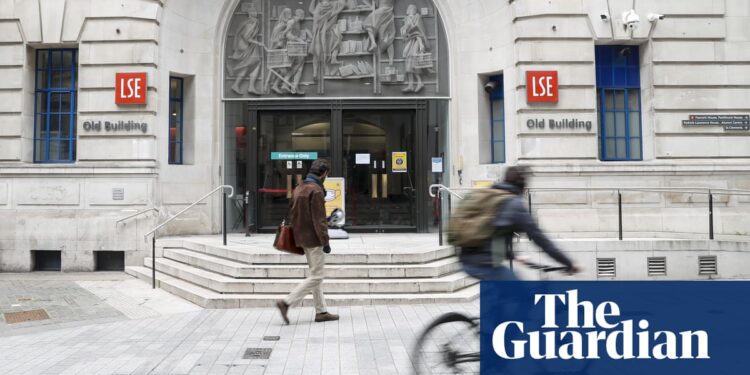The London School of Economics has been criticised by a UN rapporteur and accused of Islamophobia after raising an allegation that students behind a pro-Palestine demonstration in July had prompted fears of a repeat of the 7/7 terrorist attacks.
A total of seven students, four of them female, have been put under “precautionary measures”, restricting their access to the university’s campus, over allegations relating to a noisy protest on 7 July in the atrium of the LSE student services centre.
In letters informing the group of the action and the potential for further disciplinary measures, the university said that “several witnesses, including security guards, and members of staff, expressed concerns, fear and distress” over their conduct.
One staff member quoted by the university claimed that the demonstration had led “many in the room” to fear a “physical attack”. This feeling was said to have been “heightened” by its coincidental timing on the 19th anniversary of the 2005 bombings.
The students, who had been calling for the LSE to divest from companies that work with the Israeli military, deny the claims, which they say have been used to stifle free expression.
Gina Romero, the UN special rapporteur on the rights to freedom of peaceful assembly and of association, has written to the university asking it to reconsider the decision to open the disciplinary procedure.
She said: “I am concerned about information I received regarding stigmatisation and reprisals that some students of the London School of Economics are facing for their participation in peaceful protests questioning university’s investments that they consider are against [international human rights].”
One of the accused protesters, Emily, 24, a postgraduate student from France who paid £26,000 for a one-year humanities course, claimed that the linking of a peaceful pro-Palestine protest to the 7/7 attacks had been “racist and Islamophobic”.
She said: “I was four when the London bombing happened. I wasn’t even in the country, and I had never heard of the London bombing until I received my letter.
“It was said that people were running away. But we’ve been given CCTV evidence from the day that shows that no one ran away.”
The students were told initially they would be barred from access to any LSE buildings, but the university said the students had been allowed access to the library where online material was not sufficient for them to complete their studies. It is understood that the students who have yet to submit their dissertations have also been granted access to the library from Monday to Friday, between 9am and 5pm.
The masked students, who were carrying a banner and megaphone, stand accused by the university of “shouting loudly and aggressively as they marched down in military style” into the atrium to demonstrate at 11.45am on 7 July.
after newsletter promotion
A staff member’s testimony, presented by the university as evidence of the group’s alleged behaviour, further said: “Many people in the room were fearful that this was a physical attack. This feeling and fear was especially heightened given that it was the anniversary of the London bombings.”
The account continued: “A female student literally sprinted out of the room in fear. This cannot be overemphasised, the student was clearly fearful for her life, which could have far-reaching consequences for her.”
Anas Mustapha, the head of public advocacy at the campaign group Cage, said: “The London School of Economics’ vilification, suspension and mistreatment of its students exemplifies one of the harshest responses to student activism in the UK and is deeply troubling.”
An LSE spokesperson said its investigation was continuing. She said: “Freedom of speech and expression are of utmost importance to LSE and underpin everything we do. Our free speech policy is designed to protect and promote peaceful freedom of expression on campus.
“LSE will take measures against protesters only if a protest crosses the line into illegality, is threatening to individuals, or significantly disrupts the community. The escalated tactics alleged to have been used by protesters on 7 July included intimidating and frightening people and a significant obstruction of LSE staff trying to perform their duties. Numerous individuals present described it as an extremely distressing experience.
“While we do not generally comment on the specifics of disciplinary action, we can confirm that LSE itself did not compare the demonstration with the 7/7 London bombings. Any mention of the 7/7 attack came from a witness impact statement by a member of the community who was affected by the protest.”






